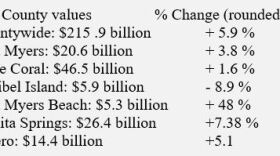Mental health experts are sounding alarms over an increase in stress among a rising number of Southwest Floridians.
Agencies say they're treating more people than in recent years, and most people say they have one culprit, one big problem, to blame.
"The cost of living is just out of control," Peter Lance said. He's a single father of four who said he lost his house in Hurricane Ian. Now, with help from his parents, he said he's living in a small place among the trailers in Suncoast Estates, North Fort Myers.
"We used to live in Bonita and the rent is skyrocketing," Lance said. "Astronomical. Not even two working parents can afford it, let alone a single parent."
"It's agonizing, depressing, dejecting, demoralizing. Is that enough?" Joan Perotti of Cape Coral said.
She explained that the family of one of her daughters recently became homeless. She said they just couldn't afford to pay the rent.
"They are living with friends right now.," Perotti said. "I don't know what the future holds for them. But I can't support two whole households."
Stacey Cook is president of SalusCare -- the public-supported non-profit organization that treats people with mental and chemical dependency issues.
"I have not seen this level of anxiety and depression," Cook said. "It is absolutely an epidemic - this increase in depression, anxiety. It's a burden for our entire community."
Reverend Rickey Anderson of Followers of Christ Ministries spoke to Fort Myers city council members about what's happening in the neighborhoods.
"In this town there are more hurting people than you ever, ever imagined," Anderson said. "I've been preaching almost 49 years and I've never seen so many depressed people — they don't want to live. Because of the low money they get."
The man in charge of the local Salvation Army said housing costs compared to incomes have gotten badly out of balance since Hurricane Ian. Major Ethan Frizzell said more seniors are losing their homes. So the agency is converting one wing of its homeless shelter in Fort Myers to senior-only beds.
And Stacey Cook of SalusCare is helping to start a program to treat health care workers, who've had to cope with the pandemic, then Ian, and now the high cost of living. She said her agency just lost a valuable and long-time employee, who had to move because she can't afford to live here any longer.
"Her rent increased 800 dollars. There was just no way," Cook said.
Single dad Peter Lance said he has an opinion on why this is happening now in Southwest Florida.
"We're over-populated, over-taxed, over-worked and underpaid!" he said.
The federal government is supposed to start sending $600 million for housing to this area in 2024. But experts said creating affordable housing, and easing stress on people could take a long time.
WGCU is your trusted source for news and information in Southwest Florida. We are a nonprofit public service, and your support is more critical than ever. Keep public media strong and donate now. Thank you.







